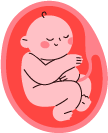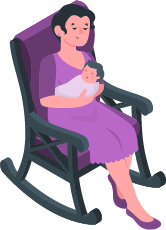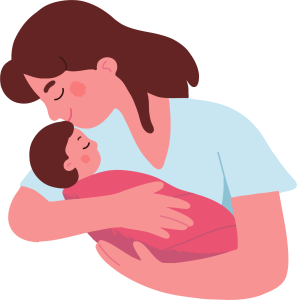First month: the mother

This month is very exciting and thrilling for you because you already know you are going to be a mom.
At the beginning of the month, nothing will change in your body and most likely your symptoms will be mild or unnoticeable.
Generally, by the end of this month you are likely to have symptoms such as:
- Breast pain
- Nausea or vomiting, mostly in the morning
- Absence of menstruation
- Mood swings
 Tip: Seek prenatal care as soon as you know you are pregnant. It is essential that you and your baby receive good prenatal care and avoid complications during pregnancy. If you take any medications or nutritional supplement, it should be under medical supervision.
Tip: Seek prenatal care as soon as you know you are pregnant. It is essential that you and your baby receive good prenatal care and avoid complications during pregnancy. If you take any medications or nutritional supplement, it should be under medical supervision.
First month: your baby
In this first month, your body and especially the uterus, has begun to undergo changes, for example, the thickness of the endometrium increases.
- This growth is in preparation for the implantation of the fertilized egg.
- At this stage your baby is seen as a small ball of cells, which is embedded in the uterine wall for the formation of the placenta.

- Subsequently, this small ball of cells will divide into two groups to form a flattened disc, from which all the organs and tissues of your baby’s body will originate.
- This period is known as embryonic, and will conclude at the beginning of the second
Second month: The mother
At this stage hormonal changes affect virtually every system of the body.
- You may notice weight gain or loss, exhaustion, breast tenderness, stomach upset, vomiting (morning sickness) and mood swings.
- Tiredness, very sleepy and increased appetite.
- At the beginning of pregnancy monitoring, we may advise you to take some medication to prevent fetal malformations.
 Tip: It is time to start with a balanced diet, rich in proteins and minerals, since your baby’s development will depend on the nutrients you consume.
Tip: It is time to start with a balanced diet, rich in proteins and minerals, since your baby’s development will depend on the nutrients you consume.
Second month: your baby
- In this month it is possible to observe the first structures of the embryo in an ultrasound.
- The disc grows and it is differentiated into three layers: ectoderm, which will originate the nervous system and skin; mesoderm, which will originate muscles, bones, reproductive
 system, circulatory system, among others; and endoderm, where your baby’s respiratory and digestive systems will originate.
system, circulatory system, among others; and endoderm, where your baby’s respiratory and digestive systems will originate. - At the beginning of the month your baby would measure between 2 and 4 mm, before the beginning of the third month it will measure 1.3cm.
- Most of the organs are already present and will develop throughout the pregnancy.
Third month: The mother

- From this month on, the size of the abdomen increases, the breasts grow, the aureole begins to become harder and darker in color, it is possible to see the veins of both breasts.
- The skin has a smoother and shinier appearance.
- There may be an increase in weight between 1 and 1.5kg.
- Symptoms such as nausea and vomiting begin to decrease.
 Tip: Exercising will help you gain strength and endurance to support the weight gain during pregnancy and prepare you for childbirth.
Tip: Exercising will help you gain strength and endurance to support the weight gain during pregnancy and prepare you for childbirth.
Third month: your baby
- This month marks the end of the embryonic period and the beginning of the fetal period.
- The fetus is approximately 12 centimeters long and weighs approximately 65 grams.
- The genitals begin to form.
- The differentiation and specialization of organs begins.
It is very active and kicks all day long, although it is so small that you will not be able to notice it yet. The baby kicks, rolls his ankles and wrists, clenches his fists, extends his arms, bends his toes up and down, furrows his brow, purses his lips and gesticulates.
- The ears and nose will be formed by the beginning of the month, the heart is beating strongly and is fully formed.
- The placenta is formed and the umbilical cord begins to function
Fourth month; The mother

- The second trimester of pregnancy begins.
- The abdomen continues to grow, sometimes there are cramps at night, bleeding from the gums or nose.
- In this month you will be 4 to 5 kilos above your usual weight.
- The “linea alba” makes its appearance, a dark line that goes from the pubis to the navel.
- You may be able to sense your baby’s movements.
 Tip: Limit your coffee consumption; because caffeine hinders the absorption of iron and increases the risk of anemia.
Tip: Limit your coffee consumption; because caffeine hinders the absorption of iron and increases the risk of anemia.
Fourth month: your baby
- By the end of this month, your baby will be about 20 cm long and weigh almost 250 grams.
- The bones begin to ossify, the kidneys are formed and begin to function.
- Lanugo, a fine hair that covers the whole body, is visible, there is hair growth on the head and eyebrows are formed, the eyes are closed, there are already fingernails on the hands, the liver is very large because it is the one responsible for making blood cells.

- The suction reflex begins and the way in which the thumb is sucked is appreciable, fingerprints appear on the fingers of the hands.
Fifth month: The mother
 The abdomen continues to grow as well as the breasts, the movement of your baby is already perceived, at the end of the day there might be swelling of the feet and ankles.
The abdomen continues to grow as well as the breasts, the movement of your baby is already perceived, at the end of the day there might be swelling of the feet and ankles.
You may feel fatigue, a little discomfort when taking different positions due to changes in your spine, you may even have waist pain.
Some pregnant women have sciatic nerve pain, cramps, constipation, hemorrhoids, palpitations and tachycardia.
 Tip: Don’t forget to visit your dentist regularly. Hormonal changes during pregnancy make you more susceptible to gingivitis or sensitive gums.
Tip: Don’t forget to visit your dentist regularly. Hormonal changes during pregnancy make you more susceptible to gingivitis or sensitive gums.
Fifth month: your baby
- It is 25 cm long and weighs about 300 grams.
- The skin is less transparent, the organs continue to grow, the baby’s position is very changeable.
- The body is covered with a substance called vernix caseosa, a fatty, whitish substance, which protects your baby’s skin from irritation caused by amniotic fluid and dehydration.

- The placenta also increases in size, your baby yawns, makes faces and may hiccup, the digestive system is already functional and may swallow, the vocal cords are already formed.
- In this month the bones of the ear are already developed, as well as the part of the brain responsible for registering sounds, so your baby is able to pick up internal sounds such as your heartbeat, your voice or music.
Sixth month: the mother
 During this month, your baby is very grown, so it already takes a defined position inside the abdomen.
During this month, your baby is very grown, so it already takes a defined position inside the abdomen.
The skin on your abdomen stretches, which may cause itching and stretch marks, and the skin on your face may show chloasma, which is due to the increase of estrogens.
Due to your baby’s growth and weight, your bladder may become slightly compressed, causing you to urinate more frequently.
You may have a secretion through your nipples, this is called colostrum, the fluid produced by your breasts prior to delivery, which will form the milk that will nourish your baby.
 Tip: Avoid very hot showers, as well as very hot climates, drink water regularly. It is important to keep your skin hydrated, with creams rich in natural oils.
Tip: Avoid very hot showers, as well as very hot climates, drink water regularly. It is important to keep your skin hydrated, with creams rich in natural oils.
Sixth month: your baby
- In this month your baby already reaches a height of 30 cm and weighs 600 grams.
- Their shape is “more human”, eyelashes and eyebrows begin to be defined, the eyes are centered and begin to open, the skin loses its transparency due to the accumulation of fat under it.
- The hearing will be perfected, it can distinguish other people’s voices.

- By the end of this month, it will be able to distinguish tastes, as the taste buds are already formed.
- The lungs continue to mature.
Seventh month: the mother

- Congratulations, you are now in your third and final trimester of pregnancy!
- You are likely to have insomnia, due to discomfort in finding a suitable position to lie down and sleep.
- Constipation is common due to the reduction of abdominal space and the uterus pushing up on the intestines.
- The placenta increases the blood demands to nourish the baby. This situation causes an increase in the heart rate, producing fluid retention, varicose veins and dizziness.
- Again there are emotional changes, now not only because of hormonal changes, but also because of the exhaustion that pregnancy represents, affecting the mother’s normal mood.
 Tip: If you feel tired, rest! You can practice relaxation techniques such as yoga, or take a massage.
Tip: If you feel tired, rest! You can practice relaxation techniques such as yoga, or take a massage.
Seventh month: your baby
– Your baby now weighs more than 1 kilo and is about 36 cm long.
– The amniotic fluid decreases, allowing your baby’s size to increase.
– Because of its size, the space is already very small, so it will tend to move with greater difficulty; for this reason, you will be able to feel its vigorous and powerful movements, especially in response to every stimulus.
– The skeleton already has an advanced formation and has respiratory movements, which will prepare the baby to take in air at the moment of birth.
– It already has a defined wake-sleep pattern.
– The transfer of antibodies from your blood to your baby’s blood is initiated through the placenta, so your baby will be born with defenses against disease.
Eighth month: The mother
 During this month you may feel your abdomen harden; this is due to contractions called Braxton-Hicks, which prepare the uterus for labor.
During this month you may feel your abdomen harden; this is due to contractions called Braxton-Hicks, which prepare the uterus for labor.
There may be difficulty walking, increased tiredness and heartburn, more frequent visits to the bathroom and constipation.
Your skin will feel more hydrated, your hair will be fuller and silkier due to the hormonal change
 Tip: If you feel sick or very tired, avoid taking any type of supplements or herbs without prior authorization from your doctor.
Tip: If you feel sick or very tired, avoid taking any type of supplements or herbs without prior authorization from your doctor.
Eighth month: your baby
Your baby weighs 1.7kg and is about 42 cm long.
The head is still growing, the skull bones are not ossifying, the brain continues to develop and the olfactory neurons are growing.
The skin is no longer transparent, it is pale and smooth.
Due to the lack of space, your baby loses range of motion, so you will perceive the movements as more rotational than spasmodic.
Ninth month: the mother
 Your baby is already formed, now he or she will only be gaining weight.
Your baby is already formed, now he or she will only be gaining weight.
For your part, you are likely to keep the discomfort.
It is important that you are prepared for the moment of delivery, so it is recommended for you to avoid long trips as much as possible.
You need to be aware of any changes, such as fluid leaking through your vulva, changes in your baby’s habit of movement, pain during contractions, or headaches.
 Tip: Your baby is almost born! Have a suitcase with clothes for your baby, and for you, a health card and telephone numbers of family members.
Tip: Your baby is almost born! Have a suitcase with clothes for your baby, and for you, a health card and telephone numbers of family members.
It is necessary for you to be well prepared for the moment of labor.
To do this, we recommend that you have a suitcase with the following items.
For you:
- ID card
- Social Security card or number

- Toiletries
- Two gowns or nightgowns, sandals and socks
- Underwear and nursing bra
- Hygienic towels
- Tennis or comfortable shoes
- Cell phone
For your baby:
- A change of clothes for going home
- A blanket
- A hat and socks
- Diapers

Dr. Bry’an A. Oliveros Galeana
Director IREGA Cancún
Jefe del Servicio de Medicina de la Reproducción Humana
Referencias: 1. Womenhealth.gov. Etapas del embarazo. Office in Women’s Health, U.S. Department of Health and Human Services. Consultado el 15.03.18 en: https://espanol.womenshealth.gov/pregnancy/youre-pregnant-now-what/stages-pregnancy. 2. U.S. NationalLibrary of Medicine. Desarrollo fetal. Medline Plus. National Institute of Health. Consultado el 15.03.18 en: https://medlineplus.gov/ spanish/ency/article/002398.htm. 3. Baby center. Doce pasos a seguir para un embarazo saludable. Consultado el 11.04.18 en: https:// espanol.babycenter.com/a600004/doce-pasos-a-seguir-para-un-embarazo-saludable. 4. Larousse. El futuro bebe mes a mes. Consultado el 15.03.18 en: https://www.larousse.es/catalogos/capitulos_promocion/OL00035502_9999981406.pdf. 5. El embarazo mes a mes. ReproducciOn Asistida ORG. Consultado el 15.03.18 en: https://www.reproduccionasistida.org/embarazo-mes-a-mes/ 6. Crecimiento y desarrollo fetal. New Association Academic, Journal Public Global of Medicine. Consultado el 15.03.18 en: http://sle181b62664a5fde jimcontent.com/download/version/1450891603/module/10859088699/name/CRECIMIENTO%20Y%20DESARROLLO%2OFETAL.pdf. 7. Baby center. Que Ilevar al hospital cuando vas a dar a luz. Consultado el 11.04.18 en: https://espanol.babycentercom/a900814/que: Ilevar-al-hospital-cuando-vas-a-dar-a-luz
